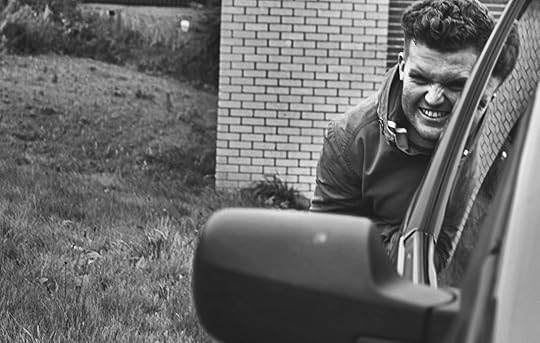Donald Miller's Blog, page 74
January 26, 2014
Sunday Morning Sermon — Winning Takes More Than Skill, It Takes Character
As a former athlete I know how hard it can be to set aside the objective of winning to think about someone else, yet this high school athlete did just that. I love this story, because it shows how rewarding it can be to have great character, even when it means you don’t “win”.
The truth is, most of us love to win. Whether we would consider ourselves competitive or not. We want to “win” when it comes to our finances, to our marriages, to our careers and to our hobbies. We like to win arguments and be “right”. But what if true happiness comes, not from winning, but from having great character?
Like Demetrius demonstrates in this video, what if winning isn’t everything?
Demetrius was not looking for credit for his good deeds. He just wanted someone else to experience joy. And, in turn, everyone won. As you watch, consider where in your life you could let somebody else win; and in turn, you might win as well.
Sunday Morning Sermon — Winning Takes More Than Skill, It Takes Character is a post from: Storyline Blog
January 25, 2014
The Best Viral Videos We Found This Week
Last week, the 10-year old washing machine drummer won the majority vote. What about this week? Vote for your favorite below in the comments.
The Best Viral Videos We Found This Week is a post from: Storyline Blog
January 24, 2014
Why My Insurance Salesman Deserves Kindness
It was one of those phone calls where I knew if I timed it right I could be done with it in a minute or two. The guy who carries our family’s insurance needed some additional information about my daughter’s car. I think all he needed was the odometer reading. I was trying to get a lower rate since she was driving it less. To be honest, though, when the Volvo is reaching close to 300,000 miles, does anyone really care about the specific odometer reading? The insurance guy did.
I finally got my daughter to text it to me so I could call it in. I didn’t want to talk to his assistants – I wanted to talk to him. He’s the one I have dealt with all of these years. I knew he’d do something useful with the information.

*Photo Credit: kamshots, Creative Commons
He hadn’t been in all morning. All of my calls had gone to voicemail. I tried his cell, his office and even his home. No live person anywhere. What was he – a bank? I didn’t want this information getting lost in his many recordings, texts or emails.
I wanted to speak directly to him. I wanted to hear him pull up my account on his computer and put the information in. I wanted to witness it with my ears. Too many times I have left specific information with people, and they claim to have never received it. This was going to save me some money. Not a lot, but why waste a few extra bucks on an insurance company when you can waste it on yourself? Oh yeah – I could also give it away. Sure. I could do that if I remember.
Note to self: Give away money you saved on car insurance.
But where was he? I tried to think like him. If he played golf that day (a distinct possibility. I’ve played with him a few times), then he’d probably take a long lunch to recover and re-hydrate, then he might run a couple of errands. Then he might head to the office to see if there was anything he needed to do in the remaining hours of the business day. Yup, I figured, that was it. So I called at 3:45 in the afternoon. He answered. Bingo! (I could be a private investigator.)
I launched right in, told him how I wanted the policy changed, asked if he was sure he understood. He sounded a little tired (golf and sun – it wears you out!) but he accommodated me. I thanked him for his immediate attention to the matter, and was about to hang up. After all, I was done with him.
He said something, though, before I could wrap up my business.
“Something you should know,” he said. He paused.I figured he was going to say something about rates going up.
“My mom died this morning,” he said. Now it was my turn to pause.
“I am so sorry. Why are you even in the office?” I asked, in a much less business-like tone. “Why aren’t you home?”
“I was looking for some papers for her, and thought they might be at the office. Then I saw that you were calling, so I picked up.”
There is a quote attributed to John Watson in the 1890s that says,
“Be kind. Everyone you meet is carrying a heavy burden.” (tweet this)
Even insurance salesmen.
Why My Insurance Salesman Deserves Kindness is a post from: Storyline Blog
January 23, 2014
How I Learned God Cares About My Fear
About once each day my dog Lucy runs into the back bedroom and cowers behind the pillows on my bed. It happens when I cook dinner, right about the time I make some noise grabbing a pot from the pile of cook-wear under the counter. You see, when I cook, Lucy thinks something bad is going to happen.
Why?
The reason ticks me off, actually.
It’s because I had a dog sitter a couple years ago who, well, taught her to be scared. Actually, I doubt it was the dog sitter, it was most likely one of the dog sitter’s friends. I can’t prove anything and have never bothered to confront anybody about it because, well, that would stir up a hornets nest and I don’t want to get into any of it.

*Photo Credit: Donald Miller, Storyline Commons
The facts are simple. Lucy used to be normal and fine when I cooked. She’d hang out waiting for a scrap of food but would never beg. She was polite but let her wishes be known and certainly didn’t mind if food hit the floor. Then, after a few-day trips, I came home to a dog who, when I stepped into the kitchen, ran into the bedroom, visibly shaking.
It was obvious somebody had done something to “teach Lucy to stay out of the kitchen.” I felt disrespected, to be sure. And that person never dog sat Lucy again. Now, years later, Lucy still does it.
Somebody got to my dog and taught her something they had no right to teach her.
The sad reality is Lucy has nothing to fear. She has no reason to run away, shivering. Her owner likes it when she’s around. Her owner isn’t bothered by her hanging out near the kitchen at all. The lesson here is that somebody else got to my dog to teach her something I didn’t want her to know. That somebody stole some of Lucy’s joy and assumed ownership of a creature that wasn’t theirs. But that’s hardly the point.
The point is, one day while comforting Lucy I wondered if there were things in my life I was afraid of, all the while my Creator grieved that “somebody had gotten to me.”
When I translate Lucy’s fear to my own life, the association is cryptic. I fear intimacy, for example, and I fear connection, I fear people will not like me, I fear failure, I fear isolation and rejection, I fear exposure.
Why?
Because somebody got to me, somebody who didn’t have the right, somebody my creator is frustrated with. And to be sure, I’ve wrongfully taught the same fear to others. I am guilty, too. As much as I’ve tried, I’ve never been able to untrain Lucy. What I do, instead, is go into the bedroom, sit on the bed next to her and rub her ears. She still has a frightened look on her face, but no longer shakes. She knows her master loves her.
I bring all this up because it’s a perfect picture of how some of us interact with God.
And it’s a perfect picture of how God must feel because somebody has gotten to us. He does not force us to face our fears, nor does he ridicule us because our fears are unfounded. Instead, He is simply with us. He sits by us, He comforts us, He provides for us, He loves us. All the while we fear, for no reason. Even death does not merit fear. Not from His perspective.
So what does God do in all this? Does He take away the fear? Likely not, otherwise He wouldn’t keep telling us in the Bible not to fear, He’d just take the fear away. What God does is not unlike what I do with Lucy. I just go into the bedroom, sit on the side of the bed and rub her ears. I speak gently with her for a few minutes, letting her know everything is going to be okay. While Lucy’s fear will likely never go away, she shakes less than she used to and she knows now that, at least in the bedroom, she is safe.
I love that God tells us He will never leave us or forsake us, that He is always with us. (tweet this)
I love that He sends us friends, truth, encouragement, provision and protection, as though He is sitting on the edge of our bed, reminding us we don’t need to fear.
What is it that strikes fear in you that shouldn’t? What sends you running into the bedroom, cowering behind the pillows? And can you sense God there with you, comforting you, telling you you’ve nothing to fear?
How I Learned God Cares About My Fear is a post from: Storyline Blog
January 22, 2014
How I Found Happiness In An Unexpected Place
It was one of those days where everything sucks.
Portland had hit freezing temperatures all week. I had to scrape ice off my windshield while trying to warm up with reheated, 3 day-old coffee. The holiday season had barely begun and already, I’d been hit with a tidal wave of work and stress.
Now in my car, I was driving and beyond pissed. Anxiety, fear, fatigue, hunger.
I’d slipped into that place where I just hate the person I was becoming more and more every minute.
At a stoplight ahead was a maroon Cadillac Deville. I slowed up behind it, waiting for the light to turn. Green means go, but the Cadillac didn’t move. I waited, gave a light honk – maybe he was looking at his phone. Nothing.
Then an elongated blast. I was seething. I poured all my frustration cathartically into the blaring of my car horn.
The Cadillac door opened and an elderly man steped out onto the icy asphalt. His face was stern.
“Oh s**t,” I said to myself and locked my doors, expecting an oncoming barrage of abuse for my tactless honking. Cars were lining up behind us as he shuffled to my driver’s side window. I cracked it an inch, just to be safe.
“Can you give me a push?” he asked. He was defeated, frustrated and fatigued. Just like me.
“Um, ya, of course.” I pulled the emergency brake and hopped out into the street. Putting my gloved hands on the back of his car, I looked back and saw the guy in the car behind me get out. So did the guy behind him. As a team, we steered the broken-down Cadillac through the intersection and into a curbside parking spot.

*Photo Credit: Click*64, Creative Commons
We all nodded to each other, guy stuff, playing it cool. The old man gave us all a wave of thanks and remarked how he had a tow truck on the way.
Back in my car, the light turned green and I drove through the intersection. I fiddled with the radio and then it hit me – I feel better. Wow. And not just a little better, like all the way better.
Instantly, my stress, fear, and dread leveled off.
It was a miracle, almost supernatural. How is that possible?
Five minutes before I hated everyone on earth. Then I pushed an old man’s Cadillac Deville thirty-five feet with three strangers and suddenly I was cured. Really?
As it turns out, the science on this phenomenon is quite robust. Social connections, like the one I had, that engage the physicality of our bodies and the empathic centers of our brains, release the reserves of a chemical called Oxytocin.
On a macro level, Oxytocin is the chemical that helps us bond with others and handle stress. It’s most famously known as the chemical released during sex, but it also helps mothers bond with their children, reduces social anxiety, relieves pain, fights depression, and even promotes generosity.
I’m not a doctor.
I’m not a therapist.
I’m not a psychologist.
But serving others and exercising your empathy muscles will make you feel better. Honestly. (tweet this)
Studies show that volunteering can boost happiness, decrease depression, relieve stress, and help you live longer.
The same is true for charitable giving. In 1989, an economist named James Andreoni theorized the Warm-Glow Giving phenomenon, concluding that people received positive emotional feelings activated by helping others. On average, people who gave away more of their money reported significantly higher levels of happiness than those who didn’t.
In 2010, more than 253 million prescriptions were written for anti-depressants in the U.S.
That’s 253 million in a nation of only 311 million people.
I’m not against anti-depressants. I think they’re important, helpful, and often times necessary. But supplementing pharmaceuticals with concrete acts of service, charity, empathy, and exercise is the sure fire way to feel better.
Want to make 2014 your best year yet?
Give your money away. Give with your time. Volunteer. Serve. Exercise the empathic centers of your brain. Not only will you start feeling better yourself, you’ll impact the lives of others at the same time.
“For it is in giving that we receive.” — St. Francis of Assisi
How I Found Happiness In An Unexpected Place is a post from: Storyline Blog
January 21, 2014
How Competition Made Me Less Successful
I have, unfortunately, viewed most of my life through the lens of competition.
I could blame it on growing up with a twin brother who is 6 inches taller and 40 pounds heavier with much broader shoulders. I could blame it on my love for sports or board games. I could blame it on countless plot lines and movies that stacked one side versus the other and glamorized the victor. But most likely, competition is just the default position of my heart.
And to be fair, it’s not all bad. Viewing life as competition has motivated me to work harder at school, work, and personal growth. It has prompted discipline and perseverance. After all, it can be really tough to win if someone else is working harder than you.
But I am beginning to see there may be a better way to live
—one that focuses less on competition and more on encouragement.
It all started with my decision to run a marathon. Finishing a marathon had always been a life dream. And the Vermont City Marathon with its beautiful scenery, quaint New England atmosphere, and community-wide appreciation proved to be a motivating opportunity.

*Photo Credit: Jon_Marshall, Creative Commons
Turning that dream into a reality proved to be far more life-transforming than I thought. While I assumed the accomplishment would be about physical fitness and mental toughness, it eventually became something greater. And in the end, it taught me countless lessons about people, life, and teamwork.
Also, it taught me the importance of competing less and encouraging more.
Marathon runners understand an important race principle: There is room at the finish line for every runner.
The 26.2 mile race is difficult for everyone (well, at least the runners I run with). Because the journey is so difficult, the race quickly becomes something greater than winning and losing. It becomes about the challenge, the experience, the unity of a common goal, and the opportunity to help someone else cross the finish line with you.
As a result, the entire route is filled with encouragement from bystanders and competitors completely committed to running well and helping other racers finish strong.
I have come to realize the mindset of competition is often based on a faulty premise.
It assumes there is a finite sized pie for success—that success in another’s life equals one less opportunity for success in mine. But quite frankly, often times, this thinking is incorrect. Whether we are discussing athletic goals, business pursuits, personal growth, or spiritual life change, the size of the pie is not finite.
In reality, the pie keeps growing. Another person’s success does not mean I have one less shot at it. In fact, another person’s success can actually become my success if I had opportunity to encourage and promote them along the way!
Viewing life only as competition has terrible drawbacks.
It pursues success for only the self. It breeds jealousy and envy. It withholds encouragement. It mistreats others on its way to the finish line. A world divided into winners and losers is one that misses opportunity to show grace.
And when the race is a spiritual one, these negative effects can be even more dangerous—especially in a world that already bends itself away from spiritual pursuits.
Our world needs people who compete less and encourage more. It desires us to be liberal with our encouragement and quick to celebrate the accomplishments of others. Look for talented people and invest into their success. Avoid speaking negatively of others.
Love, cheer, share ideas, and redirect praise.
There is room at the finish line for all of us. (tweet this)
I just wish it hadn’t taken a 4½ hour run for me to figure that out.
How Competition Made Me Less Successful is a post from: Storyline Blog
January 20, 2014
How to Know if You’re a Controlling Person
If you’d have told me a month ago I had codependent tendencies, I’d never have believed you.
I don’t like it when people try to control me (especially indirectly through manipulation) and I’d have sworn I don’t do a thing to try to control others. But it turns out that isn’t true. For all I know, I might even be manipulating you right now. Raise your hand if you think I’m trying to control you. (I see that hand. Now put it down. Now scratch your nose.)
I realized I was a controlling person not long ago when a therapist caught me in the act. I was wondering out loud why a friend was doing what she was doing and the thearpist questioned why I was trying to get inside somebody else’s head.
“What does it matter why people do what they do? Are you trying to predict behavior to gain a sense of security?”
It was a terrific observation. Trying to figure out why people are doing what they are doing is a preface to trying to control or influence them indirectly. If I really wanted to know why they were doing what they were doing, I could just ask. But I didn’t want to ask because it was none of my business. They had a right to think and do as they wished.
Turns out controlling tendencies can hide anywhere.
And most of the time (if not all the time) we don’t know we’re doing it.
The therapist went on to explain how relationships should work. She put three large couch pillows on the floor and stood on one of the outside cushions. She then had me stand on the other outside cushion so there was an empty cushion between us.

*Photo Credit: BillDamon, Creative Commons
“This is my pillow” she said, “and that is yours. This is my life and that is yours. The pillow in the middle represents our relationship. So, my responsibility is all about the pillow I’m standing on and yours is about yours. Together, we are responsible for the relationship. But at no point should I be stepping on your pillow.”
What she meant by that was this:
I can’t change anybody. I can’t force them or guilt them or shame them into doing anything. All I can do is stay on my pillow and ask myself whether or not I like the relationship. If I don’t, I can tell the other person what I want in a relationship and see if they want the same thing. If not, I move on, and so do they.
In marriage, of course, it’s much harder. You can’t just walk away. But in business relationships and friendships, and even in dating, the model works quite well.
I found the metaphor freeing, actually. No more wishing people would change or explaining “if they only did it this way we would be better friends.” Instead, I just say “this relationship doesn’t work” and there’s nothing I can do about it. If I’ve explained what I want in a relationship but the other person isn’t on board, no harm no foul.
It’s difficult in some relationships, I know, because sometimes you have to watch people destroy their lives, but that’s just the point. Their lives are theirs to destroy.
I found the principle to be true in business, too.
When somebody tries to sell a little too hard, they are on my pillow so I back off or set better boundaries. It’s also a great way to find and enter into relationships with clients. If they want what you’re selling, great, and if not, that’s also great. Business relationships work better when they’re natural and not forced and everybody stays on their pillow.
And in my spiritual life it’s the same. If somebody is giving me a guilt trip, they’re on my pillow. I believe much of evangelicalism is influenced by leaders who don’t realize they are standing all over their congregation’s pillows. Some leaders feel incredibly insecure unless they are managing the lives of everybody around them. Make no mistake, this isn’t strength, it’s incredible weakness. Just tell the truth, explain the consequences, and let people make their own decisions.
Here are a few ways to know whether you might be a controlling person:

You imagine a life in which somebody else was different, and indirectly try to affect their change.

You get angry when things aren’t going your way and you let people know it.

You can only be surrounded by people who are submissive to you.

You give the silent treatment to people you are angry with.

You are often tempted to show somebody the errors they don’t see in themselves.
What ways do you tend to step on other people’s pillows? Do you shame people (I’m guilty of that) or give them the silent treatment? How do you try to influence others without being direct or when their lives are none of your business?
How to Know if You’re a Controlling Person is a post from: Storyline Blog
January 19, 2014
Sunday Morning Sermon — This Is My Understanding Of Jesus Christ
I had the opportunity to hear Brennan Manning share this story eight years ago when I was in college. It struck me then, and it does now.
Brennan’s voice and understanding of God has been and continues to be instrumental in so many people’s understanding of God. And although this is a reading of a simple children’s story, it is incredibly powerful for me. For so many years, this is how I’ve viewed God. I only come to Him when I want something; and no matter what He gives, it’s never enough.
I don’t think I’m alone in this flawed relationship with God, but what a tragedy if I only ever take from the tree. Close your eyes and listen to Brennan read. As you do, I hope the words move you as much as they have me.
Sunday Morning Sermon — This Is My Understanding Of Jesus Christ is a post from: Storyline Blog
January 18, 2014
The Best Viral Videos We Found This Week
Last week, so many of you loved the “Living Inside the Box” video. What about this week? Vote for your favorite below in the comments.
The Best Viral Videos We Found This Week is a post from: Storyline Blog
January 17, 2014
Why It’s Ok When A Good Deed Doesn’t Get Noticed
I fly a lot. Every week I get to travel and be with hurting people – people in need of an advocate. After a fairly successful work week I was moving through the corrals of airport security on my way home. There was a mom with two kids in front of me as we all sorted our things into plastic bins to be scanned and cued up for the screener. The mom and her son made it to the other side when an agent brought an elderly woman to the front of the line. The young girl (I am guessing about 11 years old) dutifully stepped back to allow this kind lady to proceed. The girl was out of her mother’s line of sight.

*Photo Credit: vauvau, Creative Commons
I wondered how the girl would react to being separated from her mom in a busy airport. She could have responded to this situation in so many different ways. I was impressed as this poised, young girl helped someone else’s grandma collect her things on the other side of the magnetometer. The girl had a gentle smile, was bright-eyed, and acted with the confidence that she was doing the right thing in that moment. The TSA Agent gave me a knowing look of approval as together we watched the multi-generational kindness before us. In that moment, the girl was perfect.
That is exactly how I would want my kids to respond.
Then the girl grabbed her bag and moved swiftly around the corner, obviously eager to be reunited with her mom and younger brother and tell them the story. I was only a step behind the girl as she rounded the corner to see her mom. Then I watched the mother impatiently snap at her daughter, “You have to keep up! What is wrong with you?” The girl’s countenance deflated before my eyes. Her shoulders dropped, her eyes dimmed, and she meekly fell in line as the trio walked to their gate. Together they sat for some time before boarding their flight. There had been no rush.
I am sure the mom had a stressful day traveling with kids and maybe the girl had frayed the mom’s last nerve by being habitually late. Unfortunately, the mother could only know what she observed from her perspective. She couldn’t see around corners. She couldn’t see her little girl serve a stranger in such a kind way.
I wonder how many times I react too quickly with incomplete knowledge – how many times my limited perspective prevents others from telling their stories. I wonder how many kids feel shut down and marginalized when they have something delightful to share. Perhaps we permanently label people based on the repeated pattern of past failures when they are trying to build new positive habits. The girl needed a hug or high five – not a reprimand. She needed time and space to talk in the midst of a busy day.
I wanted to be that little girl’s advocate, but did not know how.
As the mom and kids walked by me to board the plane, I said to the girl, “Nice job helping out at security.” She looked up at me with an awkward gaze and smiled. She seemed relieved that someone knew what had happened … as if it made the story more real.
None of us have X-ray vision. We cannot see around corners and we all have blind spots. Sadly, it seems that we give the people we love the most, the least relational space. More than giving people the benefit of the doubt or a fresh start, I want to be an advocate for giving them room to share their evolving story. When I reach the limits of my perspective, I want to make generous instead of negative assumptions. (tweet this)
Why It’s Ok When A Good Deed Doesn’t Get Noticed is a post from: Storyline Blog
Donald Miller's Blog
- Donald Miller's profile
- 2745 followers



